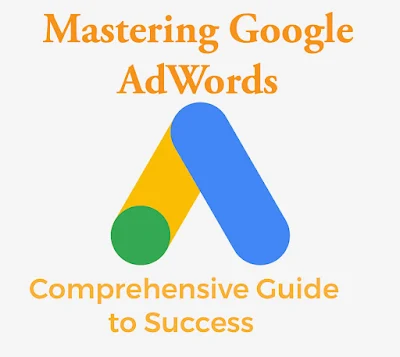In today's digital age, Google Adwords previously and Google Ads now stands out as one of the most powerful tools for businesses looking to reach their target audience online. With billions of searches conducted on Google every day, AdWords offers an unparalleled opportunity to connect with potential customers at the moment they're searching for products or services like yours.
Understanding Keywords and Targeting
1. Keyword Research:
The foundation of any successful AdWords (google ads) campaign is keyword research. Make a list of pertinent terms associated with your brand, goods, or services as a starting point. Use tools like Google Keyword Planner, SEMrush, or Ahrefs to expand your list and identify high-performing keywords with decent search volume and manageable competition.
2. Keyword Match Types:
Google AdWords (google ads) offers different keyword match types - broad match, phrase match, exact match, and broad match modifier. Each match type has its advantages and is suited for different campaign goals. Experiment with different match types to find the best combination for your campaigns.
3. Audience Targeting:
In addition to keywords, google ads allows you to target specific audiences based on demographics, interests, behaviors, and more. Refine your targeting to reach the most relevant audience for your ads, increasing the likelihood of conversions.
Creating Compelling Ad Copies
1. Ad Copy Structure:
Craft attention-grabbing headlines that include keywords and highlight the unique selling points of your products or services. To offer more information and entice clicks, use ad extensions like callouts, structured snippets, and site links.
2. Compelling Ad Text:
Write concise and persuasive ad copy that clearly communicates the value proposition to potential customers. Include a strong call-to-action (CTA) prompting users to take the desired action, whether it's making a purchase, signing up for a newsletter, or requesting more information.
Optimizing Landing Pages
1. Relevance:
Ensure that your landing pages align closely with the ad copy and keywords used in your campaigns. Provide a seamless user experience by delivering on the promise made in your ads.
2. Clear Call-to-Action:
Make it easy for visitors to take the desired action by prominently displaying a clear and compelling CTA above the fold.
3. Mobile Optimization:
With an increasing number of users accessing the internet via mobile devices, it's essential to optimize your landing pages for mobile responsiveness and fast load times.
Budgeting and Bidding Strategies
1. Setting Budgets: Determine your daily or monthly budget based on your advertising goals, target audience size, and expected return on investment (ROI). Monitor your budget allocation regularly and adjust as needed to optimize performance.
2. Bidding Strategies: Choose the right bidding strategy based on your campaign objectives. Options include manual CPC (cost-per-click), automated bidding strategies like target CPA (cost-per-acquisition) or ROAS (return on ad spend), and enhanced CPC which adjusts bids based on the likelihood of conversion.
Monitoring and Analyzing Performance
1. Key Metrics:
Track key performance indicators (KPIs) such as click-through rate (CTR), conversion rate, cost-per-click (CPC), and return on ad spend (ROAS) to evaluate the effectiveness of your campaigns.
2. A/B Testing:
Continuously test different ad creatives, landing pages, and targeting options to identify what resonates best with your audience and drives the highest conversions.
3. Performance Insights:
Use the reporting features for Google AdWords and Analytics to learn more about user behavior, demographics, and conversion paths. Use this data to refine your campaigns and improve performance over time.
Advanced Tips and Strategies
1. Remarketing:
Reach users who have previously interacted with your website or app by setting up remarketing campaigns. Tailor your ads to specific audience segments based on their past actions, increasing the likelihood of conversion.
2. Ad Extensions:
Take advantage of ad extensions like call extensions, location extensions, and price extensions to provide additional information and improve ad visibility.
3. Geo-Targeting:
Target your ads to specific geographic locations to reach customers in your target market. Adjust bids based on location performance to maximize ROI in different regions.
Mastering Google Ad requires a combination of strategic planning, creative execution, and continuous optimization. By understanding the fundamentals of keyword research, ad copywriting, landing page optimization, and performance analysis, you can create highly effective campaigns that drive targeted traffic and generate measurable results for your business.
Frequently Asked Questions
1. What is Google AdWords?
Google AdWords "google ads" is an online advertising platform developed by Google, where businesses can create and run ads to reach potential customers through Google Search, YouTube, and other partner websites.
2. How does Google AdWords work?
Bidders place their bids on particular keywords associated with their goods or services. The advertisements appear at the top or bottom of the search results page when consumers search for certain terms on Google. Advertisers pay for clicks on their ads, making it a cost-effective way to reach potential customers.
3. How much does Google AdWords cost?
The cost of Google Ads varies depending on factors such as keyword competitiveness, industry, and targeting options. Advertisers can set a budget and bid amount for their campaigns, and they only pay when someone clicks on their ad (cost-per-click).
4. How can I measure the success of my Google AdWords campaigns?
You can measure the success of your campaigns by tracking key metrics such as click-through rate (CTR), conversion rate, cost-per-click (CPC), and return on ad spend (ROAS). Use Google Analytics and AdWords reporting tools to analyze performance and make data-driven decisions to optimize your campaigns.


إرسال تعليق